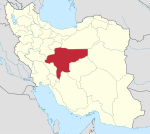Aran O Bidgol
History
The area originally consisted of two distinct and separate villages named "Aran" and "Bidgol." Each village had its own customs, social communications, and dialect. It was situated near the Silk Road and many caravans passed it on their way from Europe to the Orient.
About 40 years ago, the wall of separation collapsed and these two small towns unified. The Jandaghian family as one of the most famous ones in this city. Jandaghians have a representative in the Ministry of interiors.
Demographics
Population
At the time of the 2006 National Census, the city's population was 55,651 in 15,556 households. The following census in 2011 counted 60,290 people in 24,842 households. The 2016 census measured the population of the city as 65,404 people in 20,315 households.
Geography
The town is surrounded by desert from the north and east, and thus it has a typical climate of hot and dry in summer, cold and dry in winter, and very little rainfall during the year. These conditions make agriculture difficult.
Industry
Carpet weaving is one of the major industrial products of this city and its carpets are exported to Afghanistan, Pakistan, Iraq and other neighboring countries. Recently, sources of natural gas and oil have been discovered near the city. Unfortunately, due to the unauthorized and illegal use of underground water tables by companies such as Foulad and Zob, this city has suffered a severe water shortage crisis, and as a result, we are witnessing severe land subsidence.
Tourist attractions
- Deserts and salt lakes tours
- Camel riding in desert
- Driving on sand dunes
- Maranjab Caravansarai
- Si zan castle
- Holy shrines and religious mausoleums (belonging to the offspring of the prophet Muhammad).
Gallery
-
Aran and Bidgol desert
-
Aran and Bidgol salt Lake
-
Aran and Bidgol desert scenery is a tourist attraction
See also
![]() Aran va Bidgol travel guide from Wikivoyage
Aran va Bidgol travel guide from Wikivoyage
![]() Media related to Aran va Bidgol at Wikimedia Commons
Media related to Aran va Bidgol at Wikimedia Commons
Notes
References
- ^ OpenStreetMap contributors (25 November 2024). "Aran and Bidgol, Aran and Bidgol County" (Map). OpenStreetMap (in Persian). Retrieved 25 November 2024.
- ^ Census of the Islamic Republic of Iran, 1395 (2016): Isfahan Province. amar.org.ir (Report) (in Persian). The Statistical Center of Iran. Archived from the original (Excel) on 19 October 2020. Retrieved 19 December 2022.
- ^ Aran and Bidgol can be found at GEOnet Names Server, at this link, by opening the Advanced Search box, entering "-3053524" in the "Unique Feature Id" form, and clicking on "Search Database".
- ^ Habibi, Hassan (c. 2024) [Approved 26 June 1375]. Divisional reforms in Isfahan province. lamtakam.com (Report) (in Persian). Ministry of the Interior, Political-Defense Commission of the Government Council. Proposal 1.4.42.11764; Letter 93808-907; Notification 7044/16293K. Archived from the original on 7 February 2024. Retrieved 7 February 2024 – via Lam ta Kam.
- ^ Census of the Islamic Republic of Iran, 1385 (2006): Isfahan Province. amar.org.ir (Report) (in Persian). The Statistical Center of Iran. Archived from the original (Excel) on 20 September 2011. Retrieved 25 September 2022.
- ^ Census of the Islamic Republic of Iran, 1390 (2011): Isfahan Province. irandataportal.syr.edu (Report) (in Persian). The Statistical Center of Iran. Archived from the original (Excel) on 17 January 2023. Retrieved 19 December 2022 – via Iran Data Portal, Syracuse University.
External links
- ĀRĀN, Encyclopædia Iranica
- http://www.persiadesert.com



